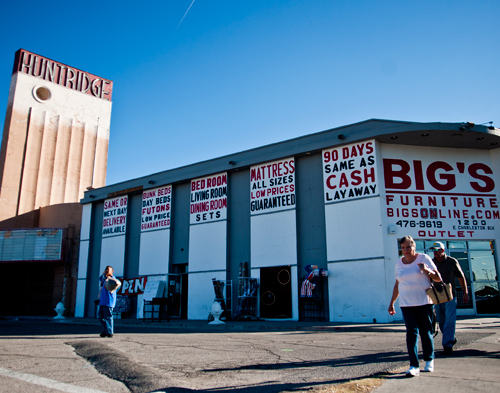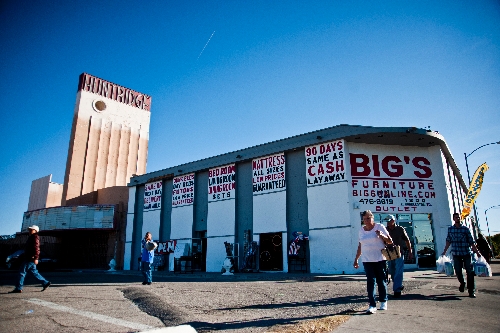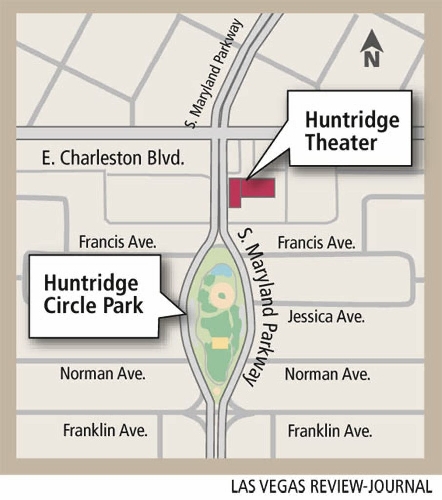Final act may be near for Huntridge theater
Cima Mizrachi says a license to run a secondhand store is the key to a second life for the historic Huntridge Performing Arts Theatre.
Her neighbors aren't buying it, though.
That's the heart of a dispute between Mizrachi, whose family owns the 67-year-old structure, and nearby residents who liken her plan to plopping a pawnshop into a neighborhood they want to become more upscale.
"They are going ghetto in an area that is redeveloping," said Steve Franklin, a resident and real estate agent who goes by the name "Downtown Steve."
Mizrachi, 26, however, says the neighbors have the wrong idea. She wants to expand her family's existing business into the Huntridge lobby, which she says would be a great place to sell vintage jewelry and other artistic and collectible products.
In fact, if she can't show her father, Aron Mizrachi, the property can generate some cash for the family business, the building could be torn down in 2017 when a historic preservation restriction expires.
"I need to prove to my family that we can make money out of it so I can show them it is worth it to maintain," Cima Mizrachi said.
It doesn't appear that she's going to get that chance. On Tuesday Las Vegas planning commissioners sided with the neighbors and voted 7-0 on two items to deny the secondhand license request, saying the Mizrachi plan would only enable further decline.
The vote is a final action unless the family appeals within 10 days.
"Someone needs to come along with a vision that can save this place and take it back to what it needs to be," Planning Commissioner Todd Moody said.
HISTORIC BUILDING
During an earlier interview in the family's furniture store housed in a building adjacent to the Huntridge, Aron Mizrachi confirmed his daughter's take on the situation.
"If they won't let me do what I want to do, it is going to come down," he said.
At stake is the future of one of the most significant historic buildings in Las Vegas.
The Huntridge, built in 1944, is listed on the National Register of Historic Places and is significant for social and structural reasons.
Socially, the Huntridge is notable because former owner Lloyd Katz refused to segregate based on race when the practice was commonplace elsewhere in Las Vegas.
The result was a community gathering place for black and white residents at a time when racial commingling was forbidden elsewhere.
"He desegregated his theaters here before he had to, which was indeed unusual in these parts," said historian Michael Green, a College of Southern Nevada professor.
The structure is praised by architecture enthusiasts for its "streamline moderne" style, characterized by the 75-foot Huntridge tower.
But in recent decades the Huntridge was surpassed by more modern multiplexes closer to newer subdivisions.
It managed a second act as a performing arts venue that hosted everything from children's acts to rock 'n' roll shows.
A roof collapse in 1995 was a setback and, despite an effort to repair it, the business couldn't survive and the building was sold to the Mizrachi family in 2002 for $925,000, according to property records.
"The capacity wasn't big enough to really compete with House of Blues or the Joint," Cima Mizrachi said.
Eli Mizrachi, Cima's brother, in 2008 proposed converting the property into a retail and office complex. But as the economy unraveled, the family realized it barely had tenants to fill its existing commercial properties, let alone new space to be created at the Huntridge.
Without the option to sell jewelry and other used items, Cima Mizrachi said there isn't much hope for preservation.
Her plan was to combine an online and new furniture business in the front of an attached building, move the used furniture to the back and save the historic portion of the property for jewelry and artistic works.
'DIFFERENT AESTHETIC'
And she promised it would be a different look than exists today at the store, a mash-up of furniture in a spare building with little attention given to merchandising or curb appeal.
"I have a different aesthetic than my dad who set this up," she said, adding her vision was to fit in with the nearby arts and Fremont East districts that are aimed at attracting younger, more sophisticated crowds downtown.
Neighbors hoped the rejection would prompt the family to either sell the property or come up with a more popular revival plan.
"We would love to see this be the beacon of the community it is capable of being," JoNell Thomas said.
























